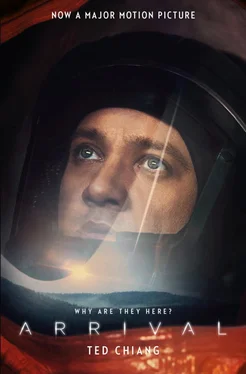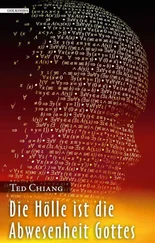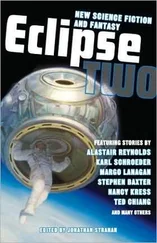Colonel Weber frowned. ‘You seem to be implying that no alien could have learned human languages by monitoring our broadcasts.’
‘I doubt it. They’d need instructional material specifically designed to teach human languages to nonhumans. Either that, or interaction with a human. If they had either of those, they could learn a lot from TV, but otherwise, they wouldn’t have a starting point.’
The colonel clearly found this interesting; evidently his philosophy was, the less the aliens knew, the better. Gary Donnelly read the colonel’s expression too and rolled his eyes. I suppressed a smile.
Then Colonel Weber asked, ‘Suppose you were learning a new language by talking to its speakers; could you do it without teaching them English?’
‘That would depend on how cooperative the native speakers were. They’d almost certainly pick up bits and pieces while I’m learning their language, but it wouldn’t have to be much if they’re willing to teach. On the other hand, if they’d rather learn English than teach us their language, that would make things far more difficult.’
The colonel nodded. ‘I’ll get back to you on this matter.’
The request for that meeting was perhaps the second most momentous phone call in my life. The first, of course, will be the one from Mountain Rescue. At that point your dad and I will be speaking to each other maybe once a year, tops. After I get that phone call, though, the first thing I’ll do will be to call your father.
He and I will drive out together to perform the identification, a long silent car ride. I remember the morgue, all tile and stainless steel, the hum of refrigeration and smell of antiseptic. An orderly will pull the sheet back to reveal your face. Your face will look wrong somehow, but I’ll know it’s you.
‘Yes, that’s her,’ I’ll say. ‘She’s mine.’
You’ll be twenty-five then.
The MP checked my badge, made a notation on his clipboard, and opened the gate; I drove the off-road vehicle into the encampment, a small village of tents pitched by the Army in a farmer’s sun-scorched pasture. At the center of the encampment was one of the alien devices, nicknamed ‘looking glasses.’
According to the briefings I’d attended, there were nine of these in the United States, one hundred and twelve in the world. The looking glasses acted as two-way communication devices, presumably with the ships in orbit. No one knew why the aliens wouldn’t talk to us in person; fear of cooties, maybe. A team of scientists, including a physicist and a linguist, was assigned to each looking glass; Gary Donnelly and I were on this one.
Gary was waiting for me in the parking area. We navigated a circular maze of concrete barricades until we reached the large tent that covered the looking glass itself. In front of the tent was an equipment cart loaded with goodies borrowed from the school’s phonology lab; I had sent it ahead for inspection by the Army.
Also outside the tent were three tripod-mounted video cameras whose lenses peered, through windows in the fabric wall, into the main room. Everything Gary and I did would be reviewed by countless others, including military intelligence. In addition we would each send daily reports, of which mine had to include estimates on how much English I thought the aliens could understand.
Gary held open the tent flap and gestured for me to enter. ‘Step right up,’ he said, circus barker-style. ‘Marvel at creatures the likes of which have never been seen on God’s green earth.’
‘And all for one slim dime,’ I murmured, walking through the door. At the moment the looking glass was inactive, resembling a semicircular mirror over ten feet high and twenty feet across. On the brown grass in front of the looking glass, an arc of white spray paint outlined the activation area. Currently the area contained only a table, two folding chairs, and a power strip with a cord leading to a generator outside. The buzz of fluorescent lamps, hung from poles along the edge of the room, commingled with the buzz of flies in the sweltering heat.
Gary and I looked at each other, and then began pushing the cart of equipment up to the table. As we crossed the paint line, the looking glass appeared to grow transparent; it was as if someone was slowly raising the illumination behind tinted glass. The illusion of depth was uncanny; I felt I could walk right into it. Once the looking glass was fully lit it resembled a life-size diorama of a semicircular room. The room contained a few large objects that might have been furniture, but no aliens. There was a door in the curved rear wall.
We busied ourselves connecting everything together: microphone, sound spectrograph, portable computer, and speaker. As we worked, I frequently glanced at the looking glass, anticipating the aliens’ arrival. Even so I jumped when one of them entered.
It looked like a barrel suspended at the intersection of seven limbs. It was radially symmetric, and any of its limbs could serve as an arm or a leg. The one in front of me was walking around on four legs, three non-adjacent arms curled up at its sides. Gary called them ‘heptapods.’
I’d been shown videotapes, but I still gawked. Its limbs had no distinct joints; anatomists guessed they might be supported by vertebral columns. Whatever their underlying structure, the heptapod’s limbs conspired to move it in a disconcertingly fluid manner. Its ‘torso’ rode atop the rippling limbs as smoothly as a hovercraft.
Seven lidless eyes ringed the top of the heptapod’s body. It walked back to the doorway from which it entered, made a brief sputtering sound, and returned to the center of the room followed by another heptapod; at no point did it ever turn around. Eerie, but logical; with eyes on all sides, any direction might as well be ‘forward.’
Gary had been watching my reaction. ‘Ready?’ he asked.
I took a deep breath. ‘Ready enough.’ I’d done plenty of fieldwork before, in the Amazon, but it had always been a bilingual procedure: either my informants knew some Portuguese, which I could use, or I’d previously gotten an intro to their language from the local missionaries. This would be my first attempt at conducting a true monolingual discovery procedure. It was straightforward enough in theory, though.
I walked up to the looking glass and a heptapod on the other side did the same. The image was so real that my skin crawled. I could see the texture of its gray skin, like corduroy ridges arranged in whorls and loops. There was no smell at all from the looking glass, which somehow made the situation stranger.
I pointed to myself and said slowly, ‘Human.’ Then I pointed to Gary. ‘Human.’ Then I pointed at each heptapod and said, ‘What are you?’
No reaction. I tried again, and then again.
One of the heptapods pointed to itself with one limb, the four terminal digits pressed together. That was lucky. In some cultures a person pointed with his chin; if the heptapod hadn’t used one of its limbs, I wouldn’t have known what gesture to look for. I heard a brief fluttering sound, and saw a puckered orifice at the top of its body vibrate; it was talking. Then it pointed to its companion and fluttered again.
I went back to my computer; on its screen were two virtually identical spectrographs representing the fluttering sounds. I marked a sample for playback. I pointed to myself and said ‘Human’ again, and did the same with Gary. Then I pointed to the heptapod, and played back the flutter on the speaker.
The heptapod fluttered some more. The second half of the spectrograph for this utterance looked like a repetition: call the previous utterances [flutterl], then this one was [flutter2-flutterl].
Читать дальше











